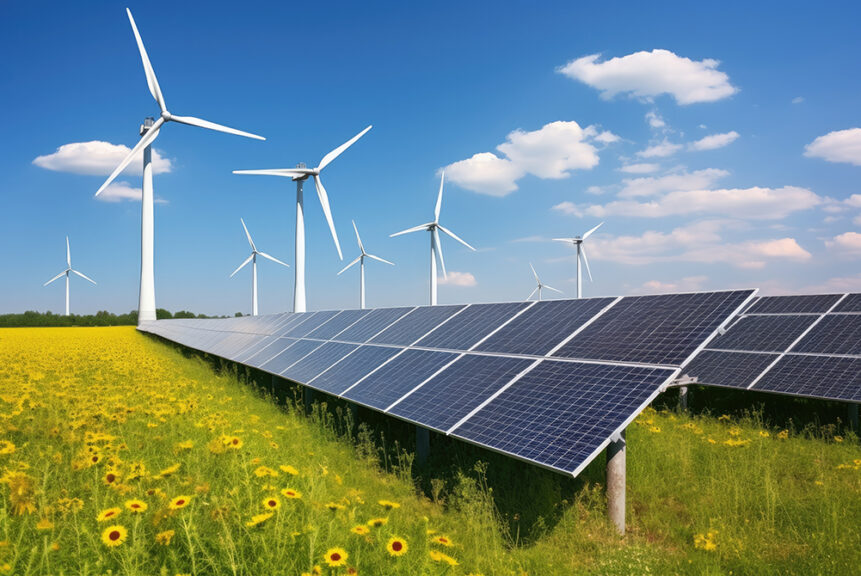The generation costs of renewable energies are decreasing. Is the logic conclusion that electricity costs will automatically decrease as well? This is often suggested in current economic policy debates. UTN Professor Veronika Grimm and her two co-authors Leon Oechsle and Gregor Zöttl from the FAU Erlangen-Nuremberg say no.
On April 10, the researcher group published a policy brief demonstrating that the generation costs (so-called LCOE-Levelized Costs of Electricity) of renewable energies is not a solid basis for predicting future energy costs. When assessing the output of wind or solar installations, upon which the LCOE calculation relies, and comparing it with the electricity demand, there will be many hours of supply gaps that need to be compensated with complementary technologies. To achieve this goal, technologies such as battery storage or gas power plants, and potentially hydrogen technology in the future, are utilized. Their investment costs must also be factored into the calculation for a realistic cost estimate. Taking this into consideration, it does not imply that electricity costs will experience significant decreases in the upcoming decade.
In their brief, the researchers calculate two different time periods: 2021 and 2040. Their calculations are based on two scenarios: demand of a big industrial customer and the general demand of a region or a country.
The result is that for all scenarios the costs are considerably higher than the usually discussed LCOE of renewable energies and that the discrepancies between LCOE and the average electricity costs will more likely increase in the future. This arises from the conventional LCOE computations omitting supplementary costs associated with renewable energies. Irrespective of the growth in renewables, standby capacity is essential to fulfill demand during periods of low wind or sunlight. The analysis underscores the imperative for substantial and expensive measures beyond renewable expansion, crucial for meeting climate targets without compromise.
The examination of electricity expenses doesn’t yield direct insights into pricing. However, one fact remains evident: costs must be shouldered by someone. This burden falls either on consumers through electricity tariffs or on current or future taxpayers if funded from the state budget. Veronika Grimm elaborates, “For instance, if a substantial portion of essential gas and hydrogen power plants receive state subsidies or operate beyond market mechanisms.” Through our Policy Brief, we aimed to elucidate these connections in a straightforward manner. Our aspiration is to spark discourse on these critical aspects and foster a more objective debate.
You can download the complete brief at the UTN website with following link:
https://www.utn.de/files/2024/04/Grimm-Policy-Brief-CD-FINAL.pdf
You may contact the authors as follows:
Contact UTN
Prof. Dr. Veronika Grimm
Energy Systems and Market Design Lab
Ulmenstraße 52i
90443 Nürnberg
E-Mail: veronika.grimm@utn.de
https://www.utn.de/departments/department-liberal-arts-and-sciences/energy-systems-and-market-design-lab/
Contact FAU
Prof. Dr. Gregor Zöttl
Professur für Industrieökonomik und Energiemärkte
Friedrich-Alexander-Universität Erlangen-Nürnberg
Lange Gasse 20
90403 Nürnberg
E-Mail: gregor.zoettl@fau.de
https://www.energiewirtschaft.rw.fau.de

The generation costs of renewable energies are decreasing. Is the logic conclusion that electricity costs will automatically decrease as well? This is often suggested in current economic policy debates. UTN Professor Veronika Grimm and her two co-authors Leon Oechsle and Gregor Zöttl from the FAU Erlangen-Nuremberg say no.
On April 10, the researcher group published a policy brief demonstrating that the generation costs (so-called LCOE-Levelized Costs of Electricity) of renewable energies is not a solid basis for predicting future energy costs. When assessing the output of wind or solar installations, upon which the LCOE calculation relies, and comparing it with the electricity demand, there will be many hours of supply gaps that need to be compensated with complementary technologies. To achieve this goal, technologies such as battery storage or gas power plants, and potentially hydrogen technology in the future, are utilized. Their investment costs must also be factored into the calculation for a realistic cost estimate. Taking this into consideration, it does not imply that electricity costs will experience significant decreases in the upcoming decade.
In their brief, the researchers calculate two different time periods: 2021 and 2040. Their calculations are based on two scenarios: demand of a big industrial customer and the general demand of a region or a country.
The result is that for all scenarios the costs are considerably higher than the usually discussed LCOE of renewable energies and that the discrepancies between LCOE and the average electricity costs will more likely increase in the future. This arises from the conventional LCOE computations omitting supplementary costs associated with renewable energies. Irrespective of the growth in renewables, standby capacity is essential to fulfill demand during periods of low wind or sunlight. The analysis underscores the imperative for substantial and expensive measures beyond renewable expansion, crucial for meeting climate targets without compromise.
The examination of electricity expenses doesn’t yield direct insights into pricing. However, one fact remains evident: costs must be shouldered by someone. This burden falls either on consumers through electricity tariffs or on current or future taxpayers if funded from the state budget. Veronika Grimm elaborates, “For instance, if a substantial portion of essential gas and hydrogen power plants receive state subsidies or operate beyond market mechanisms.” Through our Policy Brief, we aimed to elucidate these connections in a straightforward manner. Our aspiration is to spark discourse on these critical aspects and foster a more objective debate.
You can download the complete brief at the UTN website with following link:
https://www.utn.de/files/2024/04/Grimm-Policy-Brief-CD-FINAL.pdf
You may contact the authors as follows:
Contact UTN
Prof. Dr. Veronika Grimm
Energy Systems and Market Design Lab
Ulmenstraße 52i
90443 Nürnberg
E-Mail: veronika.grimm@utn.de
https://www.utn.de/departments/department-liberal-arts-and-sciences/energy-systems-and-market-design-lab/
Contact FAU
Prof. Dr. Gregor Zöttl
Professur für Industrieökonomik und Energiemärkte
Friedrich-Alexander-Universität Erlangen-Nürnberg
Lange Gasse 20
90403 Nürnberg
E-Mail: gregor.zoettl@fau.de
https://www.energiewirtschaft.rw.fau.de